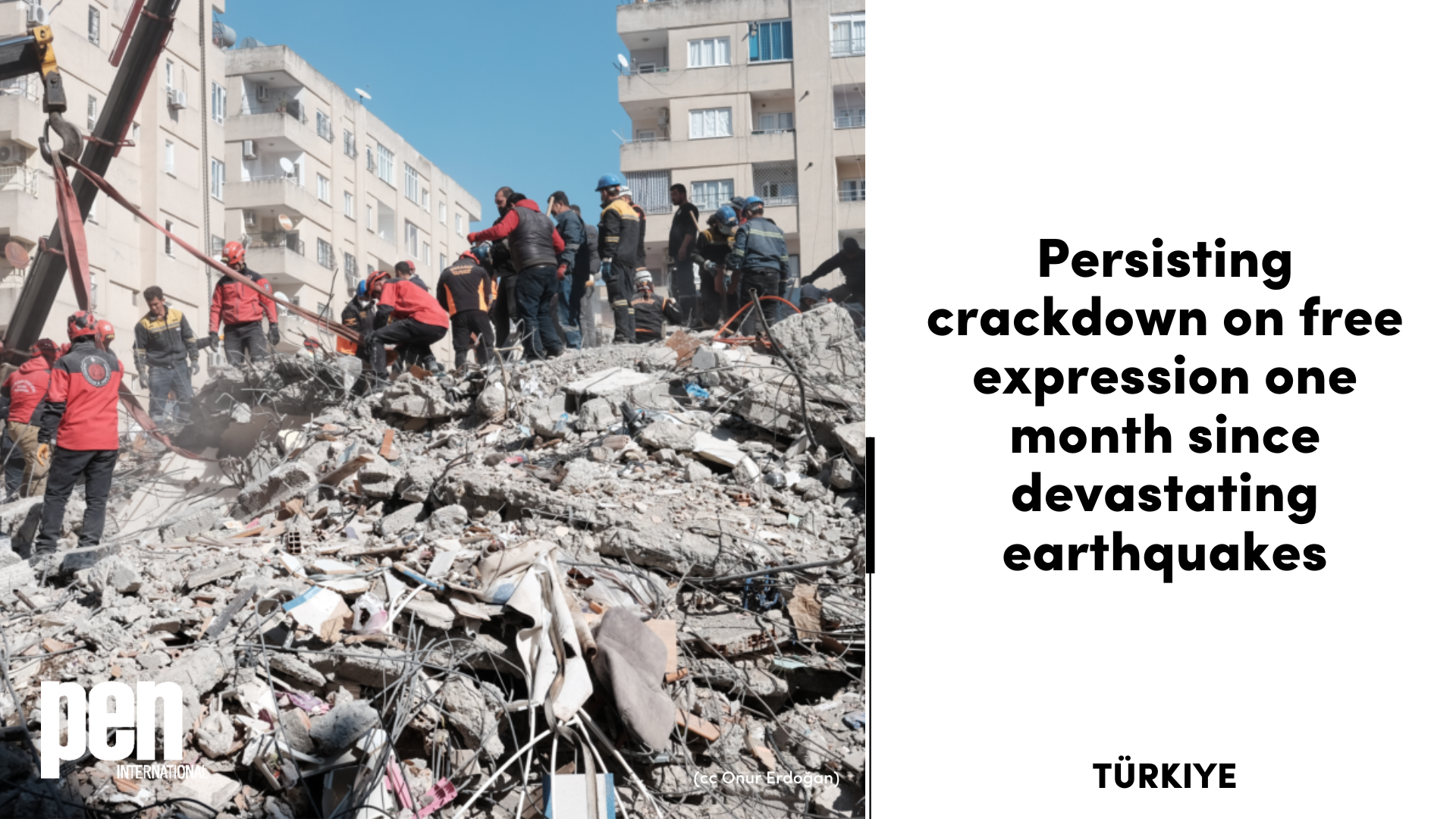Türkiye: Persisting Crackdown On Free Expression One Month Since Devastating Earthquakes
06 March 2023 – Today marks one month since devastating earthquakes struck Türkiye and Syria, resulting in the deaths of over 50,000 people, and the destruction of critical infrastructure affecting hundreds of thousands of people. PEN International urges the authorities of Türkiye to lift all restrictions on freedom of expression and access to information, as independent journalists, media outlets and publishers continue to be targeted.
Burhan Sonmez, PEN International President, said:
‘The devastating earthquakes that struck Türkiye and Syria have brought unimaginable suffering and destruction. Our thoughts are with everyone affected by this tragedy, including friends at PEN Türkiye and Kurdish PEN. We join our dear colleagues in lighting candles in remembrance of the victims, and in solidarity with the people of Türkiye and Syria during these difficult times.
Yet while we grieve the loss of loved ones, the authorities of Türkiye continue to prevent independent reporting on the disaster and are using the state of emergency in the affected areas as another pretext to clampdown on critics. The authorities must immediately allow writers and journalists to do their work and cease the use of repressive legislation to restrict the free flow of information that is so crucial at this time.’
In the aftermath of the disaster, the authorities detained several journalists, and launched criminal proceedings against some. They temporarily blocked access to Twitter, just as vital rescue efforts were being coordinated through the social media platform. They launched the divisive ‘Disinformation Reporting application’, encouraging users to report accounts that share ‘manipulative’ posts. They also actively prevented journalists from covering the disaster; only those in possession of government-issued press cards were notably allowed in the affected areas. According to the authorities, over 150 people had been detained and 29 people had been arrested for commenting or reporting on the earthquakes as of 2 March.
On 22 February, the Radio and Television Supreme Council (RTÜK) – which in recent years has been issuing fines as a tool to silence critical media – sanctioned three broadcasters in response to their coverage of the Turkish authorities’ handling of the disaster. Halk TV, Tele 1 and Fox TV were fined, while Tele 1 also had a current affairs programme suspended for five episodes. In a worrying move, the Ankara 4th Criminal Judgeship of Peace blocked access to several websites, YouTube channels and social media accounts critical against the government for allegedly disseminating terrorist propaganda and disinformation and undermining public trust. The prominent Kurdish Avesta Publishing House was one of the outlets affected by the ban. Its website was initially blocked on 22 February on trumped up charges of disseminating terrorist propaganda. Avesta Publishing House has been targeted by the authorities for years merely for producing titles in Kurdish. The ban was lifted on appeal on 28 February. Access to the popular social media platform Ekşi Sözlük was still blocked at the time of writing.
‘RTÜK should abide by its original mandate instead of seeking to silence critical and independent media content. The decision to temporary block the website of Avesta Publishing House is deeply problematic. Such a move only threatens freedom of expression and increases censorship. The authorities’ relentless crackdown on the ever-shrinking number of independent voices in Türkiye in the aftermath of the catastrophic earthquakes and in lead up to the next general elections is of grave concern, and must end once and for all’, added Burhan Sonmez.
Of particular concern before the elections planned for 2023 is the so-called ‘disinformation law’, passed by parliament in October 2022 despite fierce criticism from across civil society and the journalistic community. The new legislation consists of 40 articles amending several laws, including the Internet Law, the Press Law, and the Penal Code, with anyone found guilty of deliberately publishing ‘disinformation and fake news’ facing between one year and three years in prison.
For more information about PEN International’s work on Türkiye, please click here.
For further details contact Aurélia Dondo, Head of Europe and Central Asia Region at PEN International: [email protected]

